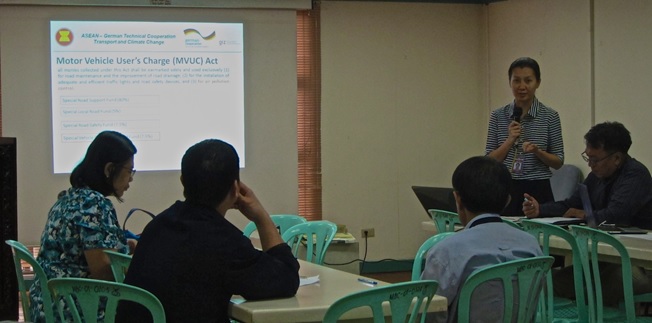Final Consultation Workshop on the Operating Policies and Guidelines for the Implementation and Monitoring of the Special Vehicle Pollution Control Fund (SVPCF) – Manila, February 2015
The SVPCF is the Philippines’ domestic fund earmarked solely for mitigation of air pollution emissions from mobile sources. The Fund is fed by a 7.5% share of the registration charge levied on owners of all types of motor vehicles and stands at an amount of PHP 5.8B (EUR 121M or USD 133M) as of February 2015. The Department of Transportation and Communications (DOTC) is mandated to develop strategies and measures relating to the utilization and management of the Fund in order to implement projects, activities, and programs (PAPs) that cover the following categories: development and enforcement of vehicle standards and regulations; vehicle pollution control research, education and training; vehicle pollution control management; and alternative vehicle pollution technology. The Environmentally Sustainable Initiatives Transportation Unit (ESITU) under the Planning Service of the Department of Transportation and Communications (DOTC) organized the “Final Consultation Workshop on the Operating Policies and Guidelines for the Implementation and Monitoring of the SVPCF”, supported by the Transport and Climate Change (TCC) project on 25 February 2015. The objective of the consultation workshop was to enable a discussion among various relevant stakeholders in order to reach a concurrence on revised policies and procedures for the implementation of PAPs under the SVPCF (‘SVPCF guidelines’). The interorganizational collaboration led by DOTC highlighted the significant impacts of having dedicated SVPCF Guidelines. Previously, proposals to access the SVPCF covered mostly measures to reduce tailpipe emissions. To enhance the coverage of eligible projects, the revised guidelines expanded the fund’s work categories to include sustainable transport initiatives following the avoid-shift-improve framework, such as shifting from passenger car use to urban mass transit; modal shift of road to rail transport; replacement or retrofitting of existing vehicle fleet; and improvement of general transport logistics to increase energy efficiency of transport. Projects and programs that generate developmental and climate co-benefits are also encouraged.

Dr. Jane Romero, GIZ-TCC consultant, presented the SVPCF Guidelines
The SVPCF Operating Guidelines provide a clear and transparent system in accessing the fund. The discussions clarified the proposal process on how to access the fund as well as the key timelines to facilitate the timely evaluation of project proposals and the eventual release of funds. During project implementation, DOTC-ESITU and the Road Board will monitor the SVPCF funded projects on a quarterly basis. At the workshop, ideas were shared on how to utilize the SVPCF as a seed fund to leverage additional funding from other external sources including climate finance. The consultation workshop also realized the potential for DOTC-ESITU to become a knowledge management hub by serving as a centralized data-sharing facility within the DOTC. It was also proposed to expand its scope to cover also climate change mitigation in the transport sector as well as organizing an annual conference that enables knowledge-sharing on the different sustainable transport and climate change-related experiences pertinent to the utilization of the SVPCF. The Final SVPCF Operating Policies and Guidelines is expected to be signed and approved by Hon. Joseph Abaya, Secretary of DOTC, and endorsed to the Road Board for concurrence by Hon. Rogelio Singson, Chairman of the Road Board and the Secretary of the Department of Public Works and Highways.

Dir. Florencia Creus, Director III of the Planning Service of DOTC (center) with the participants of the workshop